Literary tourism enhances cultural experiences by connecting travelers with the stories and authors that shape regions. This article explores how literature influences travel choices, the immersive experiences offered through literary festivals and themed tours, and the economic benefits for local communities. It also addresses challenges faced by tourism operators in promoting literary-themed experiences effectively.
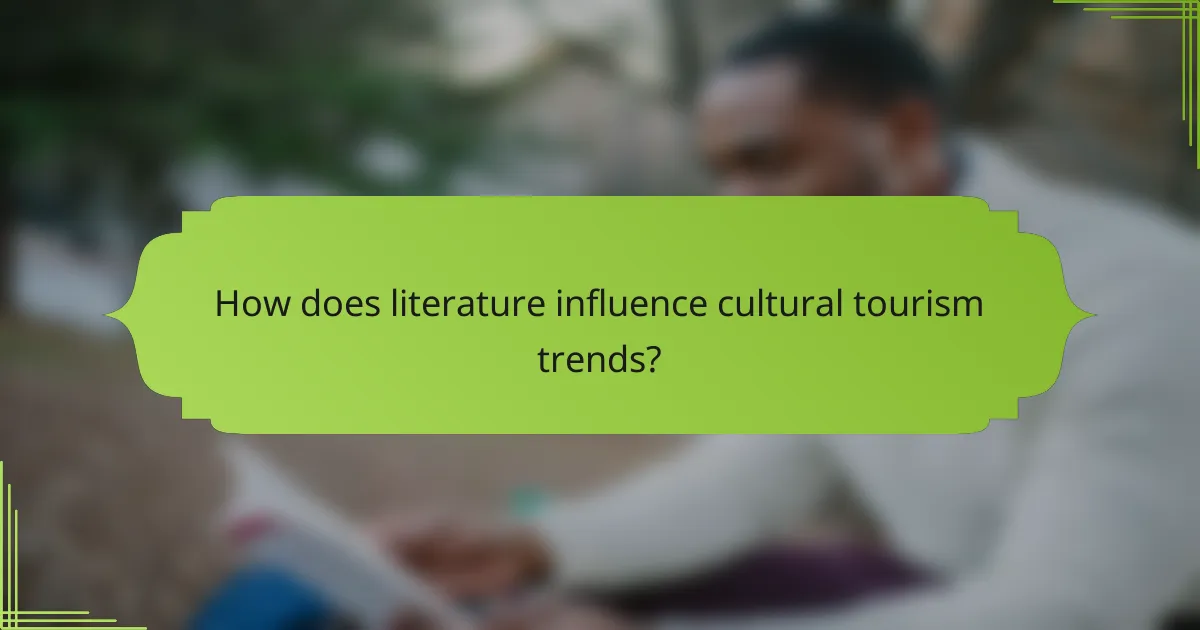
How does literature influence cultural tourism trends?
Literature significantly shapes cultural tourism trends by attracting visitors to literary landmarks and events. Literary works often inspire travel to locations featured in novels or associated with authors. For example, the popularity of Shakespeare’s birthplace in Stratford-upon-Avon draws numerous tourists annually.
Unique attributes of literary tourism include immersive experiences, such as guided tours based on famous books. These experiences enhance engagement, allowing visitors to connect deeply with the narratives and settings. As a result, destinations can see increased economic benefits from tourism.
Additionally, literary festivals, such as the Hay Festival in Wales, create cultural hubs that foster community engagement and attract global audiences. These events often highlight local culture, making them vital for promoting regional tourism.
Overall, literature serves as a powerful catalyst for cultural tourism, influencing travel choices and enriching the visitor experience through unique and immersive literary connections.
What are the key literary works driving cultural tourism?
Key literary works driving cultural tourism include classics like “Pride and Prejudice,” “Moby Dick,” and “The Great Gatsby.” These texts inspire travel to their settings, enriching cultural experiences. For instance, the Brontë Parsonage Museum attracts fans of “Wuthering Heights.” Additionally, literary festivals, such as the Edinburgh International Book Festival, celebrate authors and their works, drawing visitors worldwide. Furthermore, local adaptations of famous stories, like Shakespeare’s plays in Stratford-upon-Avon, create unique cultural tourism opportunities.
Which destinations are most impacted by literary tourism?
Literary tourism significantly impacts destinations associated with famous authors and literary works. Cities like Stratford-upon-Avon, home to Shakespeare, and Dublin, linked to James Joyce, attract numerous visitors. Other notable locations include Bath, known for Jane Austen, and the Brontë Parsonage in Haworth. These sites often feature museums, guided tours, and literary festivals that enhance cultural tourism.
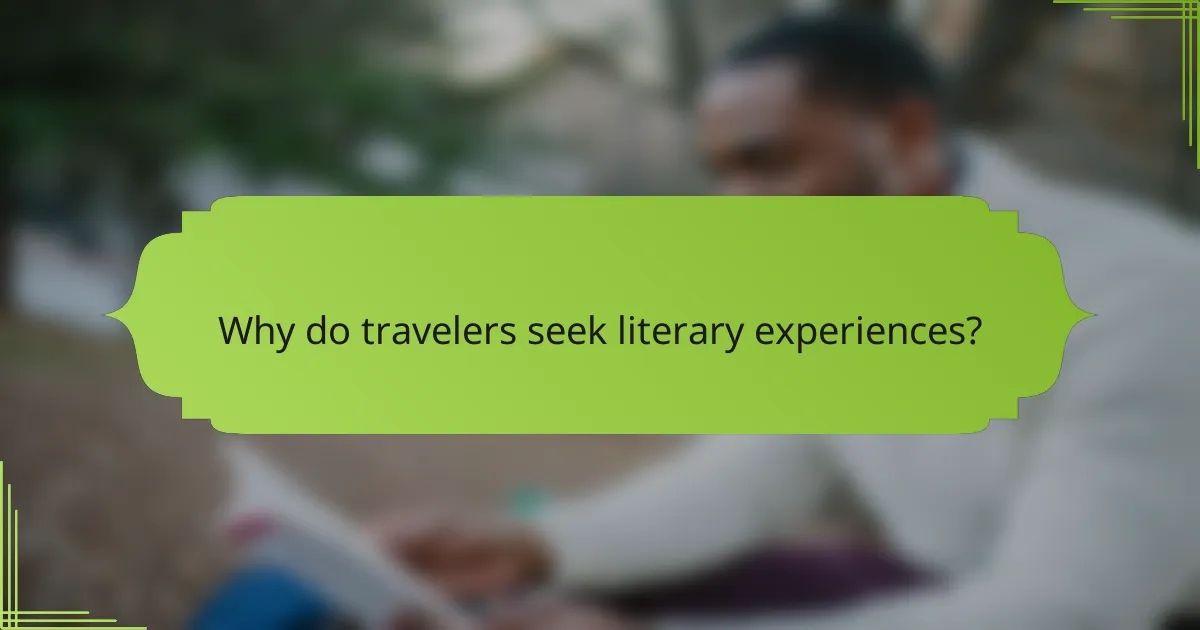
Why do travelers seek literary experiences?
Travelers seek literary experiences to connect deeply with culture and history through the lens of literature. These journeys often enhance understanding of a destination’s heritage and inspire a sense of belonging. Literary tourism allows individuals to explore the settings of their favorite books, meeting characters in real life and engaging with local narratives. This immersive experience fosters appreciation for both the literature and the culture it represents. As a result, literary journeys serve as a bridge between fiction and reality, enriching the travel experience.
What motivates literary enthusiasts to visit specific locations?
Literary enthusiasts are motivated to visit specific locations due to their connection to beloved authors, iconic settings, and cultural experiences. These journeys allow fans to immerse themselves in the narratives that shaped their favorite works.
The allure of literary landmarks often stems from unique attributes such as author homes, historical libraries, and literary festivals. For example, visiting the Brontë Parsonage Museum in Haworth offers insights into the lives of the Brontë sisters, enhancing the reader’s understanding of their literature.
Cultural tourism is enriched by literature, as locations often host events that celebrate literary achievements. This creates opportunities for enthusiasts to engage with like-minded individuals, fostering a sense of community.
Additionally, the impact of literature on local economies is significant. Cities known for their literary heritage attract tourists, boosting local businesses and preserving cultural sites. This symbiotic relationship between literature and tourism reinforces the desire for literary journeys.
How do literary events enhance tourist interest?
Literary events significantly enhance tourist interest by offering immersive cultural experiences. These gatherings attract literature enthusiasts and provide opportunities to explore local authors, themes, and historical contexts.
For example, literary festivals often feature book signings, readings, and workshops, fostering a connection between visitors and the destination’s literary heritage. As a result, tourism in these areas can increase, benefiting local economies.
Furthermore, literary events encourage themed travel, where tourists visit locations featured in famous works or associated with renowned authors. This unique attribute of blending literature with travel creates a richer cultural tourism experience.
Overall, the impact of literature on cultural tourism is profound, as it cultivates interest, engagement, and economic growth in literary-rich destinations.
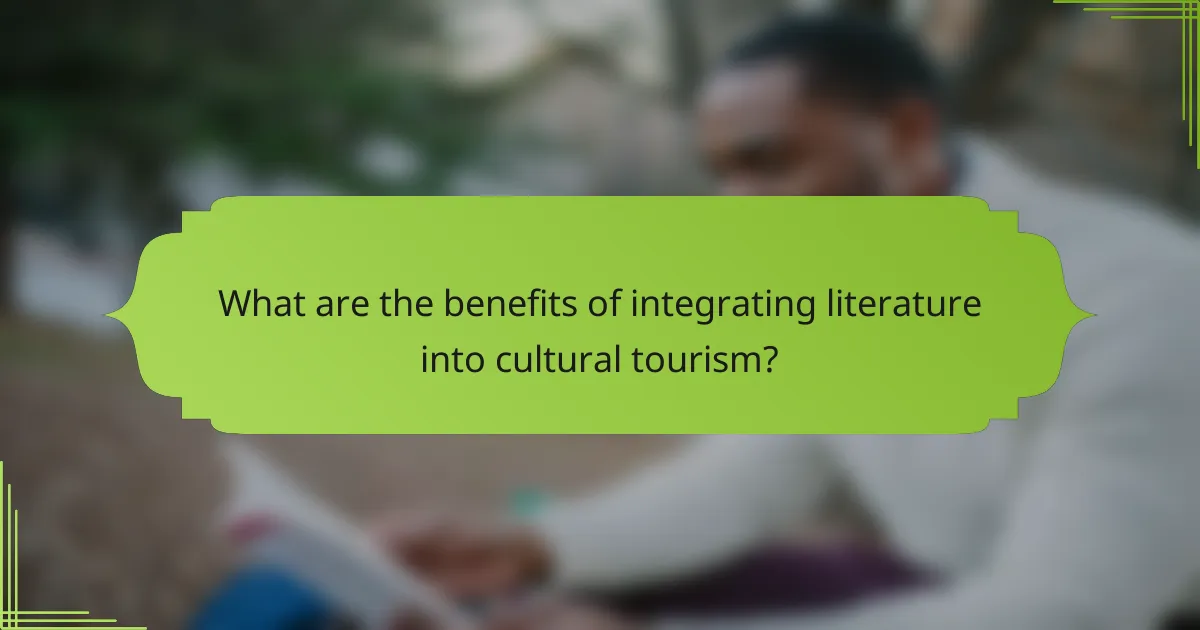
What are the benefits of integrating literature into cultural tourism?
Integrating literature into cultural tourism enhances visitor experiences, deepens cultural understanding, and promotes local economies. Literary connections create immersive environments that attract tourists and encourage exploration of destinations through the lens of their literary heritage.
Literary tourism fosters engagement with local narratives, allowing visitors to connect with authors and stories that shaped the region. This unique attribute enriches cultural tourism by offering themed tours, literary festivals, and author readings, which can significantly boost local businesses.
Additionally, literature-based tourism often includes educational programs that highlight the historical context of literary works. As a result, tourists gain insights into cultural movements and societal changes, making their visits more meaningful and enriching.
Ultimately, the integration of literature in cultural tourism not only preserves local heritage but also stimulates economic growth by attracting diverse audiences interested in literary arts.
How does literature enhance the visitor experience?
Literature enhances the visitor experience by providing deeper cultural insights and emotional connections. Engaging with local literary works allows tourists to understand a destination’s history, values, and traditions. This connection fosters a sense of place and enriches the overall journey. For example, visiting locations tied to famous authors can create memorable experiences that go beyond typical sightseeing. Additionally, literary events and festivals attract visitors, promoting cultural exchange and community engagement.
What economic impacts does literary tourism have on communities?
Literary tourism generates significant economic impacts on communities by attracting visitors and fostering local businesses. It enhances revenue through increased spending on accommodations, dining, and cultural activities. For example, towns associated with famous authors often see a boost in tourism-related jobs, which can reduce unemployment rates. Additionally, literary festivals and events draw large crowds, creating opportunities for local artisans and vendors. These economic benefits can lead to improved infrastructure and community development, further enhancing the appeal of literary destinations.
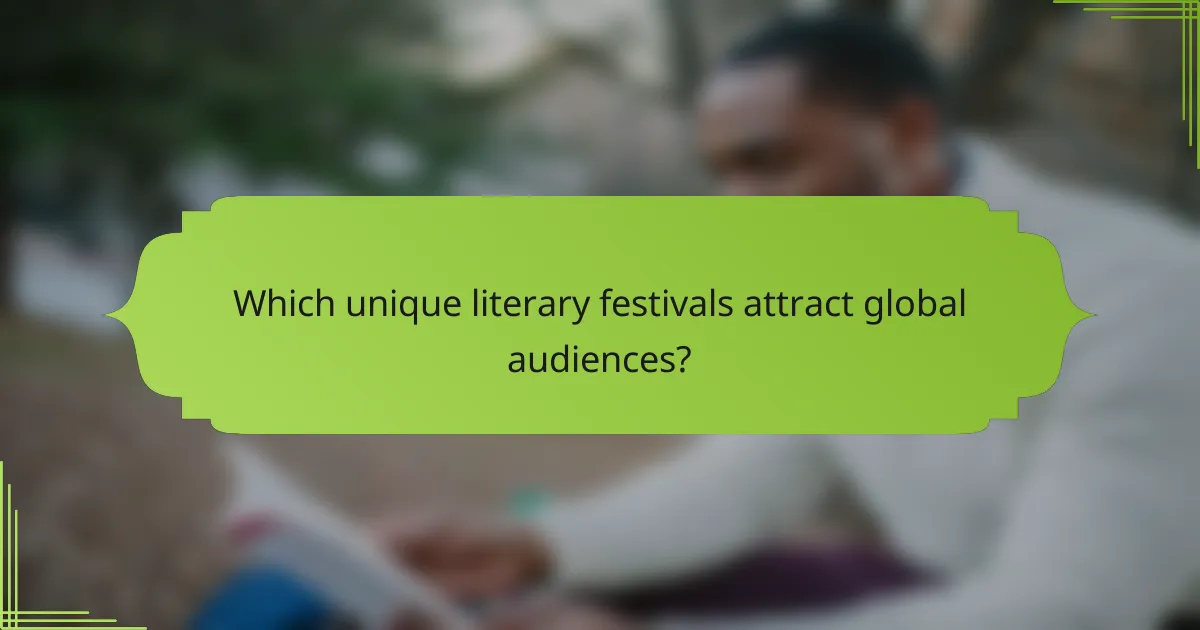
Which unique literary festivals attract global audiences?
Unique literary festivals such as the Jaipur Literature Festival and the Hay Festival attract global audiences through diverse programming and international authors. The Jaipur Literature Festival, held in India, showcases over 500 speakers and attracts around 400,000 visitors annually. The Hay Festival in Wales features renowned writers and promotes literary discussions, drawing attendees from over 30 countries. Other notable events include the Edinburgh International Book Festival, which hosts around 1,000 events and welcomes 250,000 visitors, and the Melbourne Writers Festival, emphasizing local and international voices. These festivals enhance cultural tourism by blending literature with local heritage and experiences.
What role do local authors play in promoting tourism?
Local authors significantly enhance tourism by showcasing their culture through literature. Their works often inspire travel, attract visitors, and create a deeper connection to the destination. For example, literary festivals featuring local authors can draw large crowds, boosting local economies. Additionally, novels and poetry that highlight regional landscapes or history can motivate readers to explore those areas in person. This interplay between literature and tourism fosters a unique cultural identity, enriching both the visitor experience and the local community.
How do literary adaptations influence tourism patterns?
Literary adaptations significantly influence tourism patterns by attracting visitors to locations featured in books and films. These adaptations create a cultural connection that drives interest in exploring the settings and themes depicted in the narratives.
For instance, destinations like the Lake District in England have seen increased tourism due to their association with authors like Beatrix Potter and William Wordsworth. Similarly, locations like New Zealand gained prominence through adaptations of J.R.R. Tolkien’s works.
Adaptations often lead to the development of themed tours, events, and festivals, enhancing local economies. As a result, literary tourism not only boosts visitor numbers but also fosters a deeper appreciation for the cultural heritage tied to these stories.
The unique attribute of literary adaptations lies in their ability to transform fictional worlds into tangible experiences, enticing fans to engage with literature in a new, immersive way.
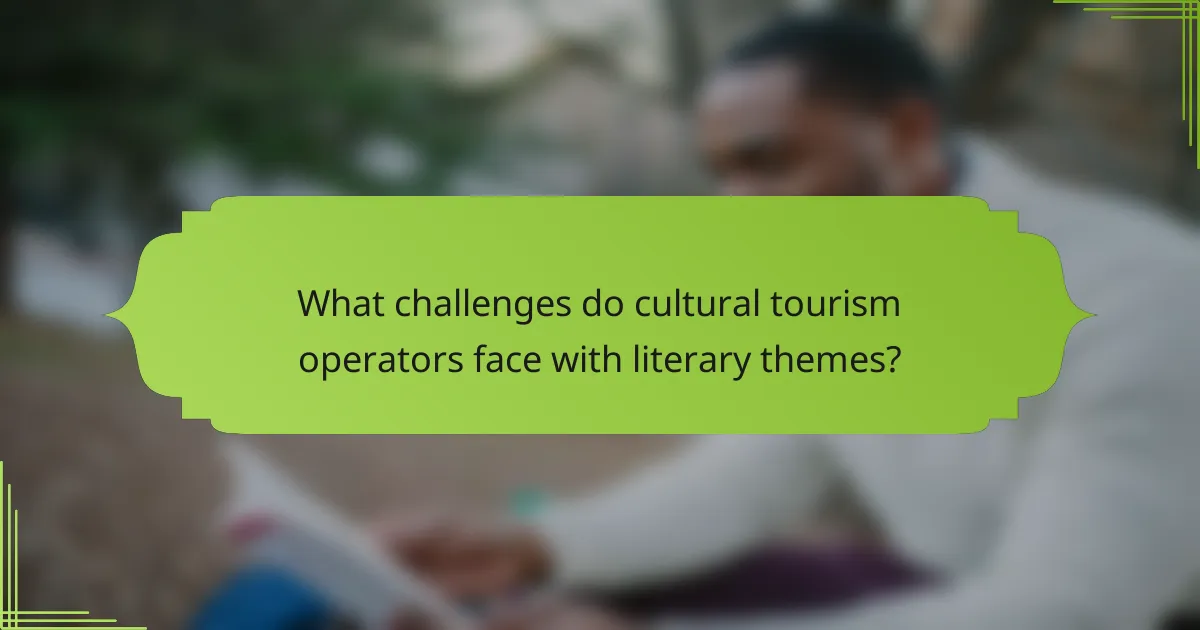
What challenges do cultural tourism operators face with literary themes?
Cultural tourism operators face several challenges with literary themes. These include limited access to authentic literary resources, fluctuating interest in specific authors or genres, and competition from other cultural attractions.
Additionally, operators struggle with marketing literary tourism effectively, as it often requires niche targeting. They may also encounter difficulties in collaboration with local literary communities, which can impact the development of engaging literary experiences.
Lastly, securing funding for literary-themed projects can be challenging, as these initiatives may not always align with mainstream tourism trends.
How can operators effectively market literary tourism?
Operators can effectively market literary tourism by highlighting unique literary experiences and connecting them to local culture. Engaging storytelling can attract visitors who seek immersive experiences related to their favorite authors or books.
Utilizing social media platforms allows operators to share captivating content, such as author interviews and behind-the-scenes looks at literary landmarks. Collaborating with local authors or hosting literary festivals can enhance visibility and draw in a targeted audience.
Offering themed tours that explore the settings of famous literary works can create memorable experiences. This approach not only emphasizes the cultural significance of literature but also fosters community involvement and support for local businesses.
Finally, leveraging partnerships with educational institutions can promote literary tourism as an enriching experience, appealing to schools and universities focusing on literature studies.
What are common pitfalls in promoting literary destinations?
Common pitfalls in promoting literary destinations include lack of authentic storytelling, neglecting local culture, and insufficient marketing strategies. Focusing solely on famous authors can overlook emerging writers and diverse narratives. Engaging local communities enhances the visitor experience, yet many campaigns fail to incorporate their voices. Additionally, reliance on traditional media without leveraging social platforms limits outreach. Lastly, neglecting to measure visitor engagement and feedback can hinder future improvements.
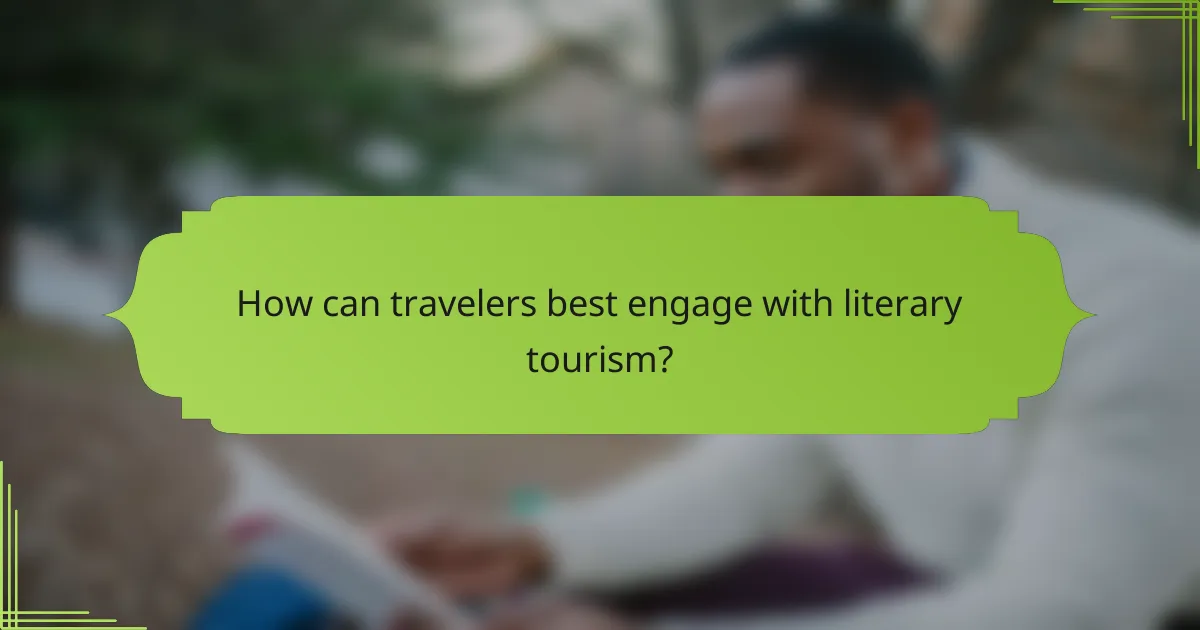
How can travelers best engage with literary tourism?
Travelers can best engage with literary tourism by exploring locations featured in literature, participating in themed events, and visiting author homes. These activities enhance their connection to the narratives and cultures represented in the works.
Literary trails, such as those inspired by famous authors, provide immersive experiences. For example, the Brontë Parsonage Museum in Haworth offers insights into the lives of the Brontë sisters. Engaging with local bookshops and literary festivals allows travelers to discover regional literary voices.
Additionally, guided tours often include readings or discussions, enriching the experience. As a result, travelers gain a deeper appreciation for the literature and its cultural context.
What are the best practices for planning a literary-themed trip?
To plan a literary-themed trip effectively, focus on key elements that enhance the experience. Identify destinations linked to authors or literary works, such as museums, historic homes, or literary festivals. Research the best times to visit for events or guided tours. Create a reading list of relevant literature to enrich your journey. Engage with local literary communities for insights and recommendations. Finally, document your experiences to share and reflect on the impact of literature on cultural tourism.
Which resources are essential for literary travelers?
Essential resources for literary travelers include guidebooks, literary maps, author biographies, themed tours, local libraries, and literary festivals. These tools enhance the experience by connecting literature with cultural landmarks. Guidebooks provide insights into literary sites, while literary maps visually represent locations tied to famous works. Author biographies offer context about writers’ lives, enriching the journey. Themed tours immerse travelers in specific literary genres or authors. Local libraries serve as hubs of literary culture, and literary festivals celebrate works and authors, fostering deeper connections with literature.
How can travelers support local literary cultures during their visits?
Travelers can support local literary cultures by engaging with local authors, attending readings, and purchasing books from independent bookstores. These actions promote the preservation of literary heritage and encourage the growth of community-based literary initiatives. Supporting local literary festivals also enhances cultural exchange and fosters connections between travelers and residents. By participating in workshops or discussions, travelers can gain deeper insights into the region’s literary traditions and contribute to its cultural vibrancy.